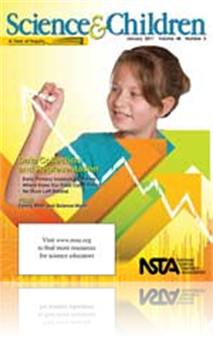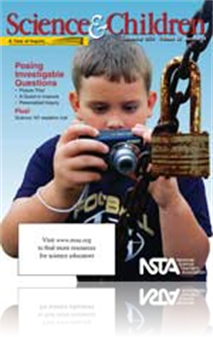All Science and Children resources
Journal Article
Making time for science is a genuine complaint among classroom teachers. As a former fifth-grade teacher and district curriculum coordinator, the author’s moment of truth came one morning while juggling classroom housekeeping tasks. Her students we...
Journal Article
Guest Editorial: Helping Young Learners Make Sense of Data—A 21st-Century Capability
Providing opportunities for students to ask questions about scientific phenomena they encounter in their world is a critical aspect of students learning science. Asking questions leads to students designing ways to collect data to support their claim...
Journal Article
This inquiry-based investigation focused on shadow measurement and the apparent movement of the Sun throughout the school year. Students would collect data about their shadows weekly. Toward the end of the year, students would then organize and inter...
Journal Article
Science 101: What is the best way to represent data?
To answer that question, let’s look at various ways to represent data. Below are several situations along with graphs or charts that help visualize them....
Journal Article
Teaching Through Trade Books: Thought-Provoking Questions
Why, what, and how: Three words that young students often speak when they are full of questions about activities and experiences in their daily lives. Helping students clarify their thought processes and ask a question that can be answered through sc...
Journal Article
In addition to meeting National Science Education Standards (NSES) related to the history and nature of science (NOS), reading or hearing about real scientists helps students connect with science emotionally. The authors have even noticed increased s...
Journal Article
The “Testable Question Relay” was created as part of a fourth-grade unit on conducting science experiments. In the relay, student teams raced to “outfit a scientist” by correctly categorizing questions as testable or untestable and earning sc...
Journal Article
Science 101: What causes things to rust?
The simple answer is that things rust when you leave them out in the rain. But maybe you want a more thorough answer. Rust is a form of corrosion, which is broadly defined as the wearing away of materials due to chemical reactions. So corrosion appli...



